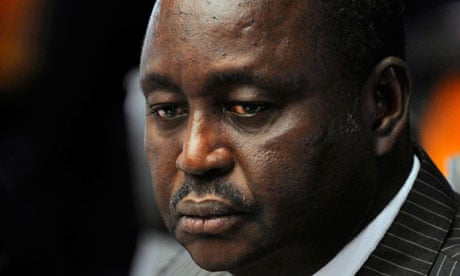The Central African Republic has been plunged into a fresh crisis as rebels advanced towards the capital, Bangui, after threatening to topple the country's president.
The United Nations began evacuating staff and the United States urged its citizens to leave the country as a coalition of dissident rebel fighters from the north of the CAR, Séléka, extended its grip.
A UN spokesman said the secretary general, Ban Ki-moon, "strongly condemns the armed attacks on several towns in the Central African Republic perpetrated by the coalition of rebel groups. These developments gravely undermine the peace agreements in place and the efforts of the international community to consolidate peace in the Central African Republic.
"The rebels' contradictory messages and their continued military offensive seem to indicate that they might be intent on taking Bangui."
Séléka began capturing territory earlier this month, and has now seized control of around a dozen towns including four regional capitals in the mineral-rich state.
There are reports that the group is less than 50 miles away from Bangui after ousting the CAR army and troops from neighbouring countries who were supposed to provide a buffer to protect the city.
The news prompted the CAR's president, François Bozizé, to issue a public plea for international assistance as thousands of supporters marched through Bangui protesting against the rebel advance and accusing France, the former colonial power, of abandoning the country.
"We ask our French cousins and the United States of America, the great powers, to help us to push back the rebels … to allow for dialogue in Libreville [the capital of nearby Gabon] to resolve the current crisis," he told the crowd.
"There is no question of allowing them to kill Central Africans, of letting them destroy houses and pillage, and holding a knife to our throats to demand dialogue."
But France, which has 250 troops stationed in the Central African Republic, resisted calls to provide military assistance to the country, stating that its forces would be deployed to protect the French embassy after it was attacked by protesters earlier this week.
"If we have a presence, it's not to protect a regime, it's to protect our nationals and our interests and in no way to intervene in the internal business of a country," said the French president, François Hollande, on Thursday. "Those days are over."
A deputy spokesman for the French foreign ministry, Vincent Floreani, said the crisis should be resolved through dialogue.
The advance by Séléka is the latest in a long history of chronic instability in the CAR since it obtained independence from France in 1960. It has suffered from internal conflict and coups – including by Bozizé, who first seized power after a brief war in 2003 – as well as interlinking insurgencies in neighbouring Chad, Sudan, the Democratic Republic of the Congo and Congo-Brazzaville.
Despite some international efforts to disarm rebel groups – including a 400-strong Micopax stabilisation mission and more than €100m of EU spending on peace consolidation missions in the country since 2004 – it has seen numerous incursions.
This year alone CAR has experienced clashes in the north-east of the country between Sudanese armed forces and a group of rebels from Darfur, periodic incursions in the south-east by the Lord's Resistance Army and clashes around the Chadian border with the Chadian rebel group the FPR.
The former vice-president of the DRC, Jean-Pierre Bemba Gombo, is currently on trial at the international criminal court for war crimes and crimes against humanity including rape and pillaging allegedly committed in CAR during 2002-03.
The insurgency by Séléka began earlier this month, after the group formed citing anger at the alleged failure of the government to honour a 2007 peace deal which promised payments to former insurgents and the release of political prisoners. It began armed attacks on 10 December, and has since captured key strategic towns in the sparsely populated country.
The UN said it was continuing to engage in dialogue to resolve the conflict, as rebel leaders said they were suspending operations to allow humanitarian access and to start talks with the government. But the UN special representative Margaret Vogt told reporters that the proximity of the rebels to Bangui had left residents "petrified".
Aid workers said people had begun fleeing their homes, creating further risks.
"They flee to their fields, which means they basically go next to their crops, and just stay there without any shelter, and with minimal drinking water they can find in the area and food," said Sylvain Groulx, Médecins Sans Frontières head of mission in the CAR. "They are dire conditions."
